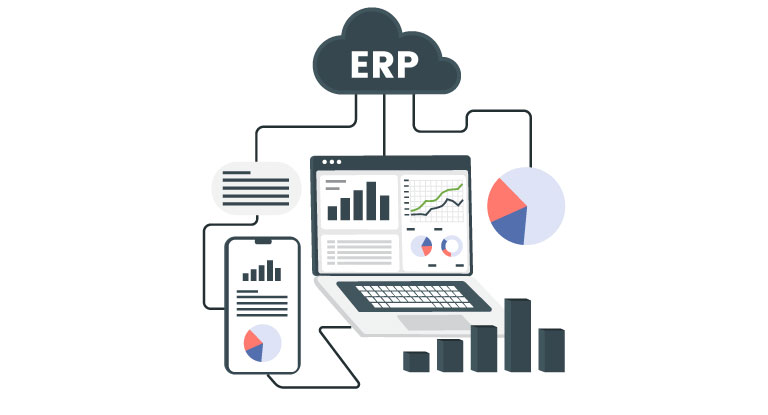In the ever-evolving landscape of modern business, staying ahead of the curve is paramount to success. One such innovation that has revolutionized the way organizations manage their day-to-day operations is Enterprise Resource Planning or ERP systems. In this comprehensive guide, we will delve deep into the world of ERP Development, exploring its definition, fundamentals, business value, historical evolution, and the modern paradigm shift to cloud-based ERP solutions. By the end of this article, you will not only grasp the significance of ERP systems but also understand how they can be a game-changer for your business.
ERP (Enterprise Resource Planning) Definition :
ERP refers to a type of software that firms use to manage day-to-day business tasks such as accounting, procurement, project management, risk management and compliance, and supply chain operations. A full ERP package also contains enterprise performance management software, which aids in the planning, budgeting, forecasting, and reporting of an organization's financial results.
ERP systems connect a wide range of company activities and allow data to move between them. ERP systems avoid data duplication and provide data integrity by gathering an organization's shared transactional data from many sources.
Connecting the Dots: How ERP Works
One of the fundamental strengths of ERP systems lies in their ability to connect various aspects of a company seamlessly. They serve as the digital glue that enables the smooth flow of data across different departments, eliminating data duplication and ensuring data integrity. In essence, ERP systems act as the nerve center of an organization, facilitating the exchange of crucial information among diverse business units.
What Makes Up an ERP System?
ERP Fundamentals
At the core of an ERP system lies a single, well-defined data structure, often sharing a centralized database. This structure guarantees that information utilized across the organization adheres to standardized definitions and user experiences. These essential components are then intricately woven together with business processes that traverse various departments such as finance, human resources, engineering, marketing, and operations. Simply put, ERP acts as the vehicle that seamlessly integrates people, processes, and technologies within a modern organization.
The Business Value of ERP
The business advantages of implementing an ERP system are abundant and impactful:
Real-time Insights: ERP provides real-time data through reports, enhancing business understanding.
Cost Efficiency: It reduces operational costs by optimizing corporate procedures and implementing best practices.
Enhanced Collaboration: Users can efficiently share data, fostering collaboration in contracts, requisitions, and purchase orders.
Streamlined Efficiency: ERP ensures a unified user experience across various business departments, complete with well-defined processes.
Consistency Across the Board: From back office to front office, ERP ensures a uniform look and feel across all business operations.
High User Adoption: A shared user experience and design result in higher user adoption rates.
Risk Mitigation: Enhanced data integrity and financial controls reduce the risk.
Cost Savings: Standardized and interconnected systems cut management and operational costs.
A Brief Journey Through ERP History
ERP systems may seem like a product of the digital age, but their roots extend back over a century. In 1913, Ford Whitman Harris pioneered the economic order quantity (EOQ) model, a paper-based manufacturing system. For decades, EOQ served as the production standard. However, in 1964, Black & Decker blazed a trail by merging EOQ concepts with a mainframe computer to create a material requirements planning (MRP) solution. This innovation laid the foundation for what would eventually become ERP systems.
ERP Deployment Models: Embracing the Cloud
The rise of ERP systems was meteoric in the 1990s, but it came with a price tag. Companies had to invest in on-premises hardware and software licenses, in addition to hiring consultants for customization and training. However, a game-changing paradigm shift was on the horizon.

Cloud ERP: Transforming the Landscape
Enter the era of cloud-based ERP, specifically in the form of Software-as-a-Service (SaaS). With cloud ERP, the software runs on remote servers rather than in-house, eliminating the need for expensive on-premises infrastructure. This paradigm shift means cloud providers handle patches, management, and software upgrades, often several times a year. As a result, businesses can redirect their capital and operational expenses towards new opportunities, all while staying up-to-date with cutting-edge ERP software.
7 Compelling Reasons to Embrace Cloud-Based ERP
While transitioning entirely to the cloud might not be feasible for all organizations simultaneously, here are seven compelling reasons to consider making the switch:
Embrace Innovation: Quickly adopt new SaaS technologies to stay ahead of the competition.
Maximize Your Existing System: Enhance the value of your current ERP system.
Access Cutting-Edge Technology: Stay at the forefront of technological advancements.
Reduce Dependency: Decrease reliance on external parties for software maintenance.
Elevate Finance Systems: Improve the efficiency and accuracy of financial processes.
Prioritize Security: Leverage enhanced security resources offered by cloud providers.
Attract Top Talent: Attract and retain in-demand employees by offering modern, cloud-based ERP solutions.
In conclusion, ERP systems have come a long way from their humble beginnings, evolving into indispensable tools for businesses across the globe. Whether you opt for traditional on-premises ERP or embrace the modern cloud-based paradigm, the benefits of ERP are clear: streamlined operations, data integrity, cost savings, and a competitive edge in today's fast-paced business world.

Insightful discussion on ERP development. Clear explanations and actionable advice. Thank you for sharing this valuable resource!